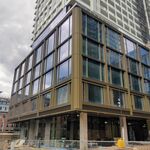G
gabe
Guest
http://www.thestar.com/news/gta/cri...to-police-100k-club-continues-to-grow#article
Toronto police salaries are spiralling upwards and will only continue to grow unless politicians have the courage to rein them in, says a former city budget chief.
David Soknacki was reacting to the release of 2009 public sector salary disclosures that list 1,329 Toronto police uniform and civilian employees who last year earned more than $100,000 – a more than 30 per cent increase from the year before.
In 2008, 1,006 employees of the Toronto police service earned more than $100,000.
Those fattened pay cheques do not include lucrative "paid duty," where off-duty officers, paid by private companies, earn $60 to $70 an hour to perform such duties as directing traffic around construction.
"Politically, it's toxic" to question whether the city can afford to pay policing costs, said Soknacki, who left office in 2006.
"When money comes up for police, it's very, very difficult to push back.
"It's difficult to say you're for public safety, you're for having a safe and vibrant city but, at the same time, we can do things better in public safety," he said.
Now chairman of Downsview Park, the former city councillor is preparing a paper on policing, commissioned by the Toronto Board of Trade, which aims to set the agenda in the October mayoralty race.
In 2004, just 250 on city police payroll earned more than $100,000. By 2006, the total nearly tripled to 708. By '08, 1,006 made the club. By '09, 1,329.
Salaries and benefits for 5,588 uniform and 2,000 civilian employees represent 90 per cent of the police operating budget, which is closing in on $900 million. Earlier this month, the force was pressed to cut its 2010 operating budget by $4.1 million, which will delay the hiring of new uniform officers.
Mayoralty candidates responding to Toronto Star questions about the "sunshine list" raised concerns about paying police officers overtime to sit in court for traffic-related offences – a source of some of the paycheque-enhancing overtime received by cops.
Michael Thompson, who was paid $161,892, and Abdulhameed Virani, who collected $151,042, were among the 380 constables who topped the $100K club in 2009.
Thompson and Virani didn't rack up their overtime as homicide detectives on 24-hour call.
Instead, they nearly doubled their salaries – the base salary of a first-class constable is $87,500 – in large measure by writing traffic tickets that require them to make frequent court appearances.
Uniformed officers grumble privately that politicians don't mind because they generate income for the city.
Under the Toronto Police Association collective agreement, police officers who attend court as witnesses during a scheduled off day are paid a minimum four hours, at 1.5 times their basic wage, even if the appearance lasts 10 minutes. Officers receive three hours of pay at time and a half if they appear in court before a scheduled shift.
"This practice certainly raises questions about how resources devoted to community safety and policing are being used and I think it would be appropriate to ask the police services board to put in place a strategy to manage these avoidable costs," leading mayoralty candidate George Smitherman said by email.
Deputy mayor Joe Pantalone – also a candidate for mayor in the October municipal election – said Saturday "$100,000 is a lot of money for the average person. But if it's ensuring public safety, then it's worth it. However, whenever you see these numbers, it should give you pause to think. Is there a way of delivering services more efficiently?"
Soknacki said he would be concerned if ticket-writing cops are padding their own overtime. If "somebody writes the ticket with the expectation that they will get an additional overtime payment for attending court, that's a bit troubling."
It's less about blaming officers, than being concerned about the system, he said.
"I think anybody, given the opportunity, to make that type of overtime ... is something a great many people will take."
Toronto police spokesman Mark Pugash argued Saturday the number of officers earning more than $100,000 has risen because of base pay hikes, not overtime. Officers received a 10 per cent pay increase over three years, including a 3.16 per cent hike in 2010, as part of a 2008 arbitrated settlement.
The $100,000 salary disclosure ceiling "has remained unchanged for 14 years so the numbers will go up each year whether people work any extra overtime or not," Pugash said Saturday.
"Overtime is scrutinized very closely," he added. Unit commanders are given daily accounts of overtime and quarterly updates on employees on track to exceed $100,000, in order to "keep a close eye on where the money is going."
In its most recent bulletin, the civic watchdog group, Toronto Police Accountability Coalition, called for a serious look at police spending and how police services can be delivered more cost effectively.
Things to look at include: "reducing the use of two-officer police cars, cutting the loose four hours each day from shift overlaps, cutting back on random patrol," it says.
Toronto police salaries are spiralling upwards and will only continue to grow unless politicians have the courage to rein them in, says a former city budget chief.
David Soknacki was reacting to the release of 2009 public sector salary disclosures that list 1,329 Toronto police uniform and civilian employees who last year earned more than $100,000 – a more than 30 per cent increase from the year before.
In 2008, 1,006 employees of the Toronto police service earned more than $100,000.
Those fattened pay cheques do not include lucrative "paid duty," where off-duty officers, paid by private companies, earn $60 to $70 an hour to perform such duties as directing traffic around construction.
"Politically, it's toxic" to question whether the city can afford to pay policing costs, said Soknacki, who left office in 2006.
"When money comes up for police, it's very, very difficult to push back.
"It's difficult to say you're for public safety, you're for having a safe and vibrant city but, at the same time, we can do things better in public safety," he said.
Now chairman of Downsview Park, the former city councillor is preparing a paper on policing, commissioned by the Toronto Board of Trade, which aims to set the agenda in the October mayoralty race.
In 2004, just 250 on city police payroll earned more than $100,000. By 2006, the total nearly tripled to 708. By '08, 1,006 made the club. By '09, 1,329.
Salaries and benefits for 5,588 uniform and 2,000 civilian employees represent 90 per cent of the police operating budget, which is closing in on $900 million. Earlier this month, the force was pressed to cut its 2010 operating budget by $4.1 million, which will delay the hiring of new uniform officers.
Mayoralty candidates responding to Toronto Star questions about the "sunshine list" raised concerns about paying police officers overtime to sit in court for traffic-related offences – a source of some of the paycheque-enhancing overtime received by cops.
Michael Thompson, who was paid $161,892, and Abdulhameed Virani, who collected $151,042, were among the 380 constables who topped the $100K club in 2009.
Thompson and Virani didn't rack up their overtime as homicide detectives on 24-hour call.
Instead, they nearly doubled their salaries – the base salary of a first-class constable is $87,500 – in large measure by writing traffic tickets that require them to make frequent court appearances.
Uniformed officers grumble privately that politicians don't mind because they generate income for the city.
Under the Toronto Police Association collective agreement, police officers who attend court as witnesses during a scheduled off day are paid a minimum four hours, at 1.5 times their basic wage, even if the appearance lasts 10 minutes. Officers receive three hours of pay at time and a half if they appear in court before a scheduled shift.
"This practice certainly raises questions about how resources devoted to community safety and policing are being used and I think it would be appropriate to ask the police services board to put in place a strategy to manage these avoidable costs," leading mayoralty candidate George Smitherman said by email.
Deputy mayor Joe Pantalone – also a candidate for mayor in the October municipal election – said Saturday "$100,000 is a lot of money for the average person. But if it's ensuring public safety, then it's worth it. However, whenever you see these numbers, it should give you pause to think. Is there a way of delivering services more efficiently?"
Soknacki said he would be concerned if ticket-writing cops are padding their own overtime. If "somebody writes the ticket with the expectation that they will get an additional overtime payment for attending court, that's a bit troubling."
It's less about blaming officers, than being concerned about the system, he said.
"I think anybody, given the opportunity, to make that type of overtime ... is something a great many people will take."
Toronto police spokesman Mark Pugash argued Saturday the number of officers earning more than $100,000 has risen because of base pay hikes, not overtime. Officers received a 10 per cent pay increase over three years, including a 3.16 per cent hike in 2010, as part of a 2008 arbitrated settlement.
The $100,000 salary disclosure ceiling "has remained unchanged for 14 years so the numbers will go up each year whether people work any extra overtime or not," Pugash said Saturday.
"Overtime is scrutinized very closely," he added. Unit commanders are given daily accounts of overtime and quarterly updates on employees on track to exceed $100,000, in order to "keep a close eye on where the money is going."
In its most recent bulletin, the civic watchdog group, Toronto Police Accountability Coalition, called for a serious look at police spending and how police services can be delivered more cost effectively.
Things to look at include: "reducing the use of two-officer police cars, cutting the loose four hours each day from shift overlaps, cutting back on random patrol," it says.




